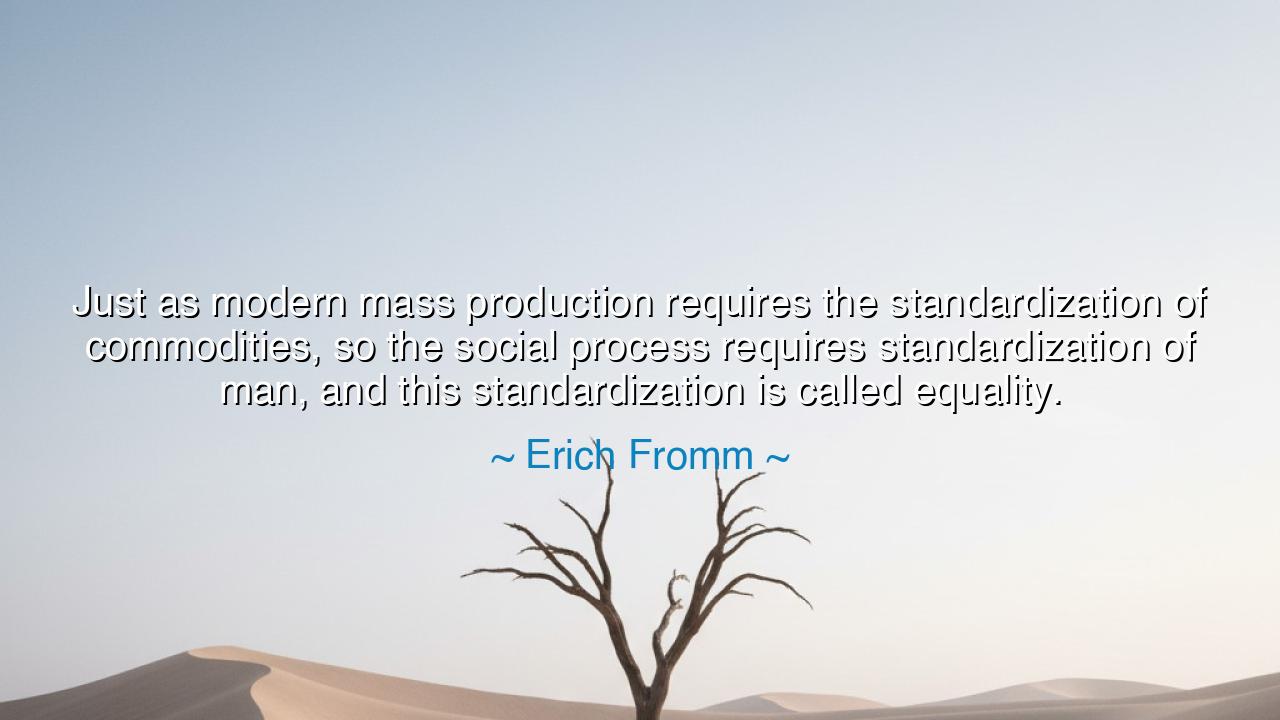
Just as modern mass production requires the standardization of
Just as modern mass production requires the standardization of commodities, so the social process requires standardization of man, and this standardization is called equality.






When Erich Fromm declared, “Just as modern mass production requires the standardization of commodities, so the social process requires standardization of man, and this standardization is called equality,” he was sounding a warning disguised as wisdom. He looked upon the modern world and saw not liberation, but uniformity—an age where men are shaped to fit machines, and souls are molded to serve systems. His words remind us that progress, if left unchecked by conscience, can turn individuality into mere function, and humanity into an assembly line of sameness. In the ancient tongue, he was saying this: the world that forgets the soul’s uniqueness in its pursuit of equality, forgets the divine spark that makes man sacred.
In the old days, the craftsman shaped each tool by hand, and each bore the mark of its maker. No two were the same, and that difference was beauty. But when the factories came, the world rejoiced in abundance and forgot the cost of the soul’s diversity. Fromm saw that the same fate was creeping into society—that in our pursuit of equality, we were beginning to demand conformity. Men no longer sought to become free in spirit, but identical in thought. This, he warned, was not the equality of justice, but the equality of obedience—a sterile balance where all shine the same dull gray.
History is filled with examples of civilizations that fell into this trap. Consider the mighty Sparta, where every boy was trained to fight and every woman to breed warriors. The city was strong, but it was soulless, for no one dared to dream beyond what the law allowed. The individual was sacrificed to the collective, and in time, that rigid perfection crumbled before the creativity of freer minds. Fromm’s words echo through that history: when the standardization of man becomes the goal, the spirit of man begins to die. A society without variance may function like a machine, but it can never truly live.
Fromm’s insight was born of his age—an era of factories, propaganda, and mass media. He saw the rise of systems that promised freedom but demanded sameness. The worker became a number, the citizen a statistic, and the dreamer a threat. Governments and corporations alike learned that a standardized people were easier to control, easier to sell to, easier to silence. The tragedy, he said, was that we began to call this equality, mistaking the leveling of difference for the lifting of the oppressed. Equality, in its truest form, is not sameness—it is the sacred right of every man to be different and still be valued.
To illustrate this, let us remember Rosa Parks, who in quiet defiance refused to give up her seat on a bus. Her act was not a cry to make all people the same, but a demand that each person be treated with dignity, no matter their color or station. True equality is not the flattening of identity, but the honoring of every identity. Parks’ courage restored the original meaning of equality—justice that recognizes the divine uniqueness in all, not the forced imitation of the few. Her rebellion, like Fromm’s warning, reminds us that freedom lives only where difference is allowed to breathe.
The ancient sages often spoke of balance, not uniformity. In a forest, no two trees are the same, yet together they form harmony. In a choir, each voice sings a different note, yet the music becomes one. Such is the ideal Fromm envisioned: a world where equality uplifts without erasing, where the individual soul remains radiant amid the collective good. When society begins to measure worth by conformity, it silences the poets, the inventors, the dreamers—the very ones who move civilization forward.
So let the lesson be clear, my children of the future: do not confuse equality with uniformity. The first is born of love, the second of fear. Cherish your differences, for they are the seeds of creation. Let your equality be the promise that every voice may rise, not that every voice must echo. Guard your individuality as you would guard your breath, for the world will always tempt you with comfort in exchange for your uniqueness. And remember always the wisdom of Fromm: that in a world obsessed with production, the rarest and most precious creation is still the authentic human soul.






AAdministratorAdministrator
Welcome, honored guests. Please leave a comment, we will respond soon